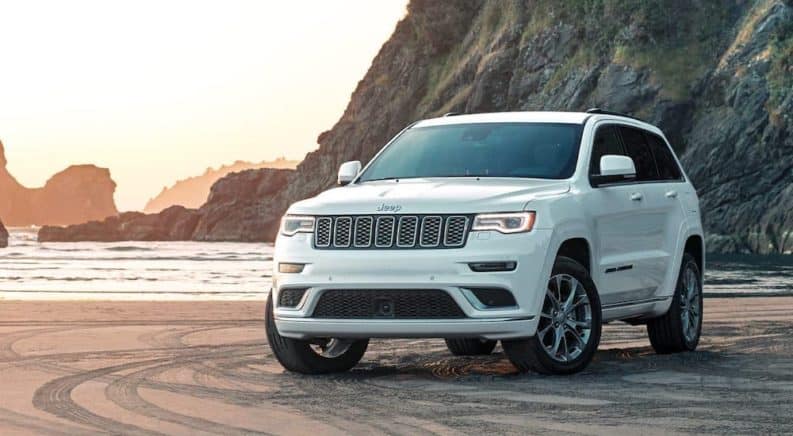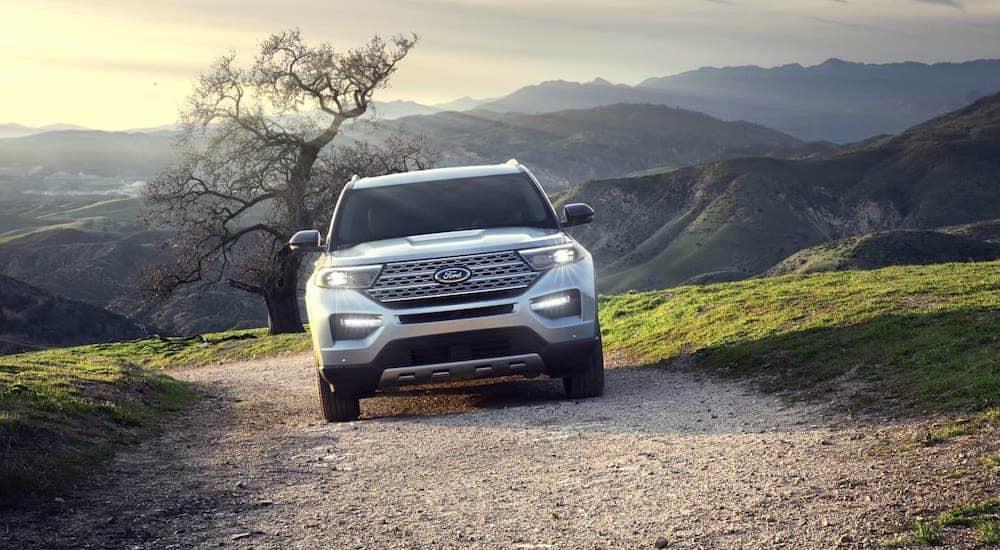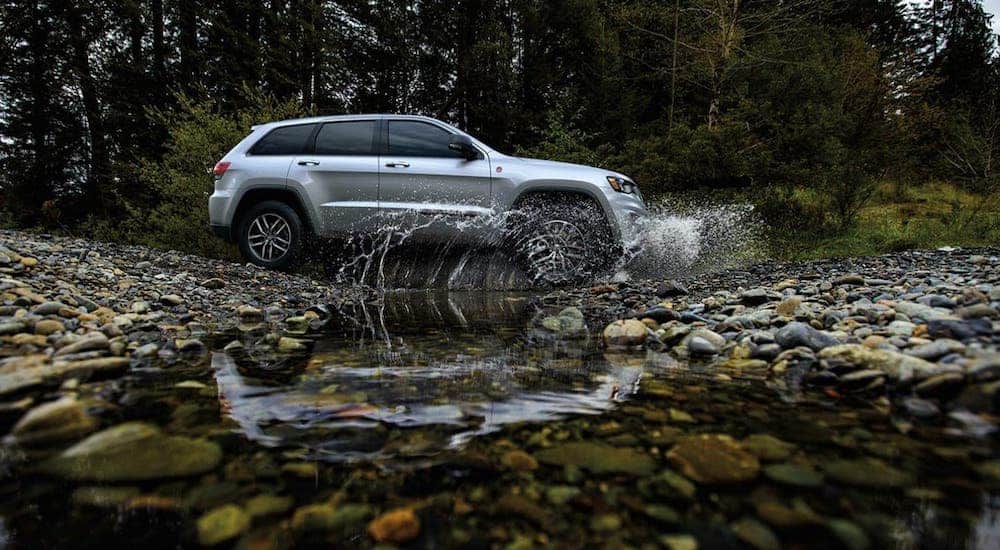Most people who buy an SUV don’t give much thought to what a sport utility vehicle is actually made to do. And due to the flurry of crossovers now popularized, the lines are getting blurred in terms of what to expect from an SUV. There are, however, still true SUVs out there; those rugged vehicles made for off-road fun that can include boondocking in the wilderness. But to which is the best? Which one really combines the sport and utility? To find out, let’s see how a couple of the most popular SUVs stand up against one another with a comparison: 2020 Jeep Grand Cherokee vs 2020 Ford Explorer.
First and foremost, both of these SUVs are built by manufacturers with long-standing reputations for building vehicles able to handle tough conditions. Jeep, of course, is the king of the hill when it comes to off-roading while Ford is known more for their everyday driver, trucklike vehicles. So today, we are going to take a look at the capabilities of the 2020 Grand Cherokee and those of the 2020 Ford Explorer to see which one of these SUVs, both from popular brands, is the best.
Engine Choices and Towing Capability
Let’s start by going over the engines that each SUV has to offer. Beginning with the 2020 Grand Cherokee, right off the bat, you have several engine choices. Standard is the 3.6-liter Pentastar V6 engine that produces 295 hp and 260 lb-ft of torque, with the ability to tow 6,200 pounds. Next up is the 5.7-liter HEMI V8 engine, which produces 360 hp and 390 lb-ft of torque. This engine can tow up to 7,200 pounds and also employs fuel-saving tech, which deactivates four cylinders when they are not being used.
The third option is the 6.4-liter SRT V8 engine, which comes with an eight-speed transmission and five drive modes: Auto, Sport, Track, Snow, and Tow. This engine puts out 475 hp with 470 lb-ft of torque and can tow up to 7,200 pounds. Last in the engine stable is the supercharged 6.2-liter V8 designed for the Trackhawk trim level, which is the most expensive. It delivers 707 hp and 645 lb-ft of torque and tows up to 7,200 pounds. Oh, and it snags a zero to sixty run in 3.5 seconds. So, there’s that.
Ford’s 2020 Explorer comes standard with the turbocharged 2.3-liter four-cylinder engine, which delivers 300 hp and 310 lb-ft of torque. It is paired with rear-wheel drive and a ten-speed transmission, though four-wheel drive is available. Choosing the four-wheel drive will also gain the terrain management system, which has seven drive modes: normal, trail, deep snow or sand, slippery, sport, tow or haul, and eco mode. This engine can tow up to 5,300 pounds.
Another engine choice for the 2020 Explorer is the twin-turbocharged 3.0-liter V6 engine, which puts out 365 hp and 380 lb-ft of torque. This engine can tow up to 5,600 pounds. Last, the engine that sits at the top of the power list is the twin-turbocharged 3.0-liter V6 that is souped up for 400 hp and 415 lb-ft of torque. It also tows up to 5,600 pounds.
The comparison here in terms of engine power seems clearly in the camp of the Jeep, which far and away tows more weight than any of the Ford options. Engine choices also go to the Jeep when it comes to the type driving one may want to do with an SUV.
Off-Road Capability
Now for the real test of which SUV has what it takes to handle conditions on and off the road: First, before choosing any vehicle with the intention of off-roading, you want to make sure it has certain specs to keep the vehicle and passengers safe. Jeep is a company well-versed in what it takes to be prepared for off-road adventures, but Ford is also known for its ruggedness. In terms of approach angles, the Jeep Grand Cherokee comes in at 36.1 degrees, with a 27.1-degree departure angle. The Ford Explorer has an approach angle of 15.6 degrees and a departure angle of 20.9 degrees. Those are relatively significant differences, and it is evident that the Jeep is the better choice when it comes to tackling inclines—an important aspect of off-road agility.
Tires are another important consideration, and even though this can be easily remedied by purchasing the tires you prefer, it’s good to know what tires come standard with a vehicle. In the case of the Jeep, the Trailhawk is the trim designed specifically for off-roading. With this trim, Jeep supplies Kevlar-reinforced all-terrain tires. The Ford Explorer is now being offered with Michelin self-sealing tires on the upper trims, though these are not rated for trails or off-road use.
Traction and stability need to be considered when taking a vehicle off-road, and both the Jeep and the Explorer have some solid features where this is concerned. Jeep offers its selectable modes for terrain types, paired with the 4×4 system. The Quadra-Drive II system takes another attack by sending available torque to the tires in need of traction. Add to this the adjustable air-lift suspension, and you have a fairly capable beast if you go with the Trailhawk trim. One more addition is that the Jeep Grand Cherokee is trail-rated, which means it checks all the boxes of what a vehicle should have to be awarded that title: traction, maneuverability, ground clearance, water fording, and articulation.
In comparison, the Explorer has its intelligent four-wheel drive system, which functions by distributing power equally to all four wheels at once. Remember that Ford also has the seven drive modes available with the four-wheel drive. One caveat here is that if you happen to be in tow mode, even with four-wheel drive, your car may hit slippery road conditions, which will not be handled as well if you can’t choose another mode while towing.
Other extras to consider are tow hooks, skid plates, fog lights, and cameras to help make driving through rough terrain easier. It is always handy to have certain features to make off-roading safer if possible. Jeep offers front tow hooks and under-mounted skid plates with the Trailhawk trim. LED fog lights are available, and all trims have a rearview camera. The Ford Explorer also has available LED fog lights and a rearview camera as standard, but a tow hook must be installed, and skid plates are not available. So, seemingly, the Explorer falls short once again.
The Better SUV
Overall, an SUV is meant for both running daily errands and taking weekend excursions into places that may not see snow plows, might require a creek crossing, or may have steep rocky ascents. For those who do not want to go out and see all of that, the Jeep Grand Cherokee is a good answer. While Ford’s Explorer has many outstanding qualities, the Jeep has a better all-around set of features, which makes it more suited to handling these potential conditions. So all in all, in the 2020 Jeep Grand Cherokee vs 2020 Ford Explorer competition, the Grand Cherokee comes out on top.






